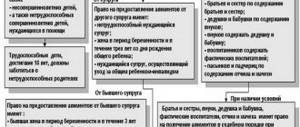Home / Alimony / Is it possible to apply for alimony retroactively?
It is not uncommon for divorcing parents to agree to share child support. Having reached an oral agreement, it seems unnecessary for parents to sign written documents or, even more so, to go to the courts and executive services.
However, verbal agreements are not always implemented. In the best case, financial support is still provided, but over time it becomes less and less frequent, in smaller amounts, until it stops completely. In the worst cases, verbal agreements are simply ignored, and monetary assistance cannot be achieved.
In the end, you have to resort to the services of judicial and executive authorities to recover money from the children. The question arises: is it possible to apply for alimony “retroactively” and receive amounts of money for the past?
How to collect alimony “retroactively”?
According to the provisions of the Family Code, you can apply for alimony at any time - not only immediately after a divorce or after some time, but even without reference to marriage or divorce. Both parents are required to support the child, regardless of whether they are married or divorced (Article 80 of the RF IC).
In most cases, the collection of alimony begins from the moment you go to court . Is it possible to claim amounts of money for a previous period when they should have been paid, but were not paid or were not paid in full?
According to Article 107 of the Family Code, amounts of money can indeed be claimed for the past - for three years . However, there must be a good reason for this. It is as follows: before going to court, the necessary measures were taken to obtain sums of money, but were not received due to the obligor’s evasion of payment .
Of course, it is not enough to simply state unfoundedly at a court hearing that attempts were made to obtain payment of money, but were not crowned with success. It will be necessary to present to the court convincing evidence of the payer’s evasion from fulfilling alimony obligations. Suitable evidence includes witness statements, telephone conversation records, video recordings, personal correspondence (letters, emails, SMS.
Expert opinion
Semyon Frolov
Lawyer. 7 years of experience. Specialization: family, inheritance, housing law.
From this we can draw the following conclusion: if a parent does not go to court, he should not seek child support payments on his own. And only if the payer categorically refuses to provide any financial support, in court it is possible to obtain funds for the past period (within the last three years).
If the payer helped the family in the slightest degree, he can provide the court with evidence of this - checks and purchase receipts, witness statements, alimony will most likely be assigned from the moment the claim is filed.
Retroactive alimony: grounds for receiving
It is necessary to distinguish between the concepts of filing a claim (application) for alimony retroactively and processing payments for the past period.
It is impossible to file a claim retroactively, because based on the fact of the appeal, a decision is made to accept it for court proceedings, after which a date for consideration of the case is set. The decision rendered will not be backdated. But you can receive funds for the previous 3 years, but you will need to prove that the parent living separately did not help the child. The verdict depends on the content of the claim and the evidence provided.
When going to court, you can justify your position based on the articles of the law:
- Art. 80 of the RF IC , which states that parents are obliged to support their children financially, and the method of providing support is determined by the parents themselves. If the father (mother) does not provide assistance voluntarily, payments are collected through the court.
- Art. 113 of the RF IC , which stipulates the parent’s right to receive alimony for the past period on the basis of the received writ of execution or agreement. In paragraph 1 of the article, the billing period is limited to 3 years. The period is determined differently if alimony was issued earlier. In paragraph 2 of Art. 113 of the RF IC states that if, in the presence of a writ of execution, non-payment was made through the fault of the defendant, he must pay the debt for the entire period. Debt collection is handled by the FSSP.
- Art. 107 of the RF IC , according to which a parent living with a child can apply to the court for alimony, regardless of how much time has passed since the moment when such a right arose, but if payments were not previously made by agreement. The award of penalties occurs from the moment of filing a claim with the court.
It will not be possible to apply for child support if the child has reached the age of 18. The judge will immediately have a question: why didn’t you apply earlier? Then the potential recipient must file a petition to restore the deadline for filing a claim and provide compelling evidence confirming that it was not possible to process payments.
To collect child support for the past period, it is necessary to prove that the second parent knew about the need, but did not want to help his child.
Who can receive retroactive alimony?
The right to issue alimony within the previous three years belongs not only to the parent with whom the minor lives, but also to the guardian, trustee, educational and medical organizations where the child is being raised.
The child’s mother has the right to apply for alimony retroactively, being legally married or divorced, without registering the relationship in the registry office. To apply, it is necessary that the man recognizes himself as the father or paternity is confirmed by a court decision. An additional condition is failure to fulfill the obligation to provide for the child.
How to apply for child support “retroactively”?
To request retroactive child support, a parent must file a lawsuit in court to collect child support. The statement of claim must focus on the fact that recently the parent, despite demands for joint maintenance of the children, has not paid money.
The following documents must be attached to the statement of claim:
- Plaintiff's passport;
- Birth certificates of minor children;
- An extract from the house register - confirmation of the fact that the children live with the plaintiff parent;
- Certificates of income of the plaintiff and defendant;
- Documentary evidence that child support was requested but not paid by the respondent parent (bank statements, witness statements, telephone records, emails or text messages).
Based on the outcome of the consideration of the claim, the court will decide whether alimony will be assigned from the moment the application to the court is made or whether the past period of non-payment will be taken into account (within three years).
How to collect alimony for previous years
The process can be divided into several stages:
- preparing an evidence base for the lack of help from the father;
- filing a claim;
- going to court;
- participation in litigation;
- obtaining a writ of execution based on a court decision;
- provision of IL to the bailiff service.
At each stage, it is recommended to enlist the support of a lawyer to resolve family issues. The specialist will be able to present the case in court by proxy, which increases the chances of winning.
Collection of evidence of non-payment of alimony
To confirm the information specified in the claim, it is recommended:
- Print data from e-mail, SMS correspondence or messages from other sources. The information must confirm that the wife, by all available means, wanted to agree on providing assistance to the child, and the husband avoided satisfying the request.
- Meet with your husband for a private conversation. During the conversation, you should justify the need for alimony, discuss issues: what the child needs, how much you have to spend on maintaining a minor. It is unlikely that you will be able to persuade your spouse to formally refuse to pay alimony, so you need to discreetly record the conversation on audio or video tape and call witnesses. It is better to involve an outsider from among neighbors, friends, or employees. Witnesses and relatives can also testify in court, but there will be a high probability of suspicion of collusion, and the testimony will be taken with distrust.
- Provide documents proving your reluctance to pay. One of them may be a copy of the court ruling to cancel the court order. It is issued after the spouse has filed an application for a writ of alimony and the husband has filed an objection.
If verbal agreements have been reached with your spouse on the collection of alimony, it is necessary to monitor the receipt of payments. As soon as a delay occurs, a demand for payment of the debt should be issued on paper and sent by mail with a notification letter. When sending, fill out an inventory of the attachment (form 107, issued by mail).
Filing a claim for retroactive alimony collection
A statement of claim is a document demanding the payment of alimony, which the plaintiff submits to the magistrate's court. The application is drawn up in accordance with the requirements of Art. 131-132 Code of Civil Procedure of the Russian Federation and contains the following data:
- In the upper right corner: full name of the justice of the peace, number of the court site, its location; Full name of the plaintiff and defendant, their addresses and other contact information. It is important to indicate the actual place of residence of the defendant, since a subpoena indicating the place and date of the court hearing will be sent to this address.
- The title of the claim is “For the recovery of alimony.”
- Document text. In the main part, the child’s full name is indicated and information about his place of residence is specified. It is further clarified that the minor does not receive help from his father; numerous attempts to hold the parent accountable did not produce results.
- The amount of alimony to be collected is indicated, as well as the period for which the spouse plans to receive money for the child.
- As arguments, it is necessary to indicate the legal acts according to which the child has the right to maintenance, as well as the provisions of the law proving the possibility of collecting funds for the previous 3 years.
- List of applications.
- Signature and date.
Sample claim:
When filing a claim, you must pay a state fee and collect applications. The entire package of documents is provided to the court, otherwise the judge may leave the claim without progress.
State duty
There are some discrepancies in the legislation regarding the amount of state duty when filing a claim for alimony. When demanding to pay the amount for the previous period, it is recommended to pay a fee of 300 rubles. as for a claim of a property nature, not subject to assessment.
If the judge considers this method of payment unlawful and returns the document, the state duty is calculated based on the cost of the claim (CI). This value is defined as the amount of payments that should have been received during the year. For example, if the requirement refers to the need to pay 25% of income monthly, and the spouse’s income is 45,000 rubles per month. , the cost of the claim is 45,000 rubles. X 25% X 12 months = 135,000 rub.
According to Art. 333.19 of the Tax Code of the Russian Federation, based on the price of the claim, a calculation is made: fixed amount + % X (price of the claim - deduction).
The state duty is at least 400 rubles. and no more than 60,000 rubles.
For example, with CI 135,000 rub. The state duty is calculated according to the formula used when the CI is 100,001 rubles. — 200,000 rub.:
- Fixed amount 3200 rub. + 2% X (CI 135,000 rub. - deduction 100,000 rub.) = 3,900 rub.
A receipt for payment of the state fee must be attached to the statement of claim. If the court's decision is positive, the defendant shall reimburse all legal costs.
Applications
The following documents are attached to the claim:
- passport (copy);
- copies of statements of claim according to the number of interested parties;
- a copy of the marriage certificate (divorce certificate, if the marriage is dissolved);
- birth certificate of the child for whom alimony is being collected (copy);
- a certificate from the place of residence confirming that the children live with the plaintiff;
- evidence that the other parent refuses to support the child;
- power of attorney if the plaintiff is represented in court by a private attorney.
The list of applications can be expanded if necessary to justify the required amount of alimony. Additionally you can provide:
- report on monthly expenses for a minor;
- certificate of the plaintiff’s salary;
- a certificate of the defendant’s income (provided to the judge upon a request to obtain evidence).
Documents are submitted to the court in person or by sending a registered letter. Some judicial authorities provide the opportunity to transfer electronic forms of documents through the State Automated System “Justice”, however, to do this, you must register in the Unified Identification and Logistics system and have an enhanced qualified electronic signature.
Adoption of a judicial decision
The decision to collect alimony for the previous period is made by the judge. The period for consideration of such cases is up to 1 month. As a result, the claimant receives a writ of execution, with which he can apply to the FSSP.
Calculation of the amount of alimony for previous years
The court decision indicates how penalties will be made:
- As a percentage of earnings. The amount is established in accordance with Art. 81 of the RF IC and is 25% for 1 child, 33% for 2 children, 50% for 3 or more children. Alimony as a share of income is not indexed, since it is believed that wages increase by default with an increase in the minimum wage.
- In the form of a fixed amount of money. The amount of payments is set as a multiple of the subsistence minimum for subsequent indexation.
- Partially as a percentage of salary, partially as a fixed payment.
The decision indicates the date from which settlement must be made. This will be done by the responsible bailiff.
If the defendant worked unofficially and there is no information about his level of income, the minimum wage in the region is taken into account, taking into account indexations.
Calculation of alimony for the past period
Alimony can be paid in two forms:
- as a percentage of earnings (one child - 25%, two - 33%, three - 50%);
- in a fixed amount.
If the parent has a regular income, alimony is assigned as a percentage of earnings - the calculation will be based on information about earnings for the last three years , from which the required percentage of alimony will be calculated.
If the parent does not have a regular income, alimony will be assigned in a fixed amount based on the minimum wage, taking into account indexation for the previous period.
Calculation of alimony.
When filing an application, you should also calculate the amount of alimony to be collected, especially if we are talking about debt.
In the case where an agreement has been concluded, it states how much the second parent must pay monthly for the maintenance of the minor.
The amount may be tied to the ex-spouse’s earnings as a percentage or remain constant. Its size depends on the number of children and the financial status of the second parent.
If the amount was not specified in the agreement, then the court can independently decide on its amount.
This is influenced by the defendant’s financial well-being, availability of official employment, and the cost of living in the region.
In the case where the father has a permanent salary, a certificate of income may be requested from his place of work, on the basis of which the calculation will be made.
Otherwise, the court may order a payment tied to the minimum wage established in a given region.
Practical advice
So, the law allows for alimony requests “ retrospectively” - for the previous three years. However, this requires strong evidence of persistent non-payment of funds despite legal demands.
Expert opinion
Dmitry Nosikov
Lawyer. Specialization: family and housing law.
What advice can you give to a parent who, after a divorce, “takes his word for it”?
- Put words on paper. It is not necessary to immediately go to court; you can draw up a written agreement, which, when notarized, will be equal to a writ of execution. If in the future there are discrepancies between the parent's promises and actions, a written document can achieve more than persuasion and threats.
- Attempts to obtain alimony from a parent and his refusal to pay must also be recorded in writing, so that documentary evidence can later be presented in court.
For the sake of fairness, something must also be said about the responsible parents, who often find themselves in an unpleasant situation. If over the past time they have provided financial support to the family (they bought clothes and shoes for the children themselves, paid for children’s vacation trips, transferred money directly to the mother), but cannot provide evidence of this - no receipts, no checks or receipts, no testimonies of friends or relatives. You can recommend that they make money transfers to a bank account while keeping the receipt, or hand it over and receive a receipt, and also keep receipts for purchases. Even SMS or emails can also serve as evidence in court if they contain information about providing financial support to the family (see “How to prove that you paid alimony?”)
Retroactive alimony collection
After a divorce, if there are children, the mother does not always receive alimony for them. In some cases, years pass before the parent raising them decides to receive the money they are entitled to. Despite the period of 5 or 10 years, you can exercise your right to demand alimony “retrospectively”. In such a situation, a natural question arises regarding the procedure itself and the maximum possible period for this.
According to Article 80 of the Family Code of Russia, the maintenance of minor children is one of the most important responsibilities of their parents. If a situation arises when a child lives with one of the parents, and the other voluntarily wants to help with his maintenance, then an agreement can be concluded between the parties to pay child support. This is done even if there are several children. Parents can also independently agree on the amount of child support.
If the described agreement is concluded between the father and mother, then the percentage of their wages may differ significantly from what is provided for when bringing this issue to court.
Forced collection is relevant if there is no such agreement, and the father or mother, who must make payments, shirk such an obligation.
According to the second paragraph of Article 80 of the RF IC, when a parent does not participate in the maintenance of the child, money can be recovered from him through the participation of the court. Please note that money can be claimed even if the marriage was not registered, as well as during the registration period or after the divorce has been filed.
Both the father and the mother can apply for child support payments.
When planning to go to court, it is recommended to prepare the following documents:
- statement (claim);
- information that a claim with documents has been sent to the defendant;
- a copy of the divorce certificate;
- a copy of the child's birth certificate;
- certificate in form No. 9 to confirm the child’s residence with the parent;
- a document that confirms the defendant’s receipt of income (optional). In the absence of information, you can file a petition through the court to obtain the necessary data;
- if you plan to claim money for a period that has already passed, you must provide documents that confirm that the plaintiff took measures to obtain funds, but the defendant evaded this obligation.
According to Article 81 of the RF IC, if there are two children, then the amount of alimony will be equal to a third of the parent’s total income.
Depending on the income of the parties, the amount can be adjusted both upward and downward. This may be affected by the situation related to existing obligations to pay other children.
People who take the initiative to collect alimony are exempt from having to pay state duty. If the court satisfies the filed claim in the operative part of the issued decision to collect funds for the state duty from the defendant.
The court can consider a case regarding alimony at both the plaintiff’s address and the defendant’s address. The first is given the opportunity to use the alternative.
It is important to understand that in court each party must prove the circumstances that it cites to substantiate the demands made and raise objections. Thus, if the plaintiff provides data on the amount of his income, then the defendant, objecting to the issue under consideration, must provide evidence in court to justify the refusal to pay or to confirm the need to reduce the payment.
If a long period of payment has already passed, recovery can only be as follows:
- if, before going to court, the plaintiff made attempts to demand child support from the other parent, the defendant. The results of such attempts were negative and funds were not transferred or paid to them. To confirm such information, it is necessary to provide evidence. An example of such information could be written or electronic correspondence between parents, confirmation of the direction of the request for payment of alimony in writing, for which an inventory receipt, postal directions are suitable. The court also takes into account the testimony of witnesses;
- funds can be recovered for the 3 years that have passed before the date of going to court.
all articles
Rubric “Question/Answer”
I haven’t filed for alimony for 2 years, and now I’ve decided to go to court. Can I demand alimony for the specified period?
Expert opinion
Semyon Frolov
Lawyer. 7 years of experience. Specialization: family, inheritance, housing law.
No, such a demand cannot be made. The court will require you to provide a document providing the basis for collecting alimony - an agreement with your ex-husband or a court writ of execution. There is no such evidence, which means it will not be possible to collect alimony for the past 2 years . Even to claim alimony for the past period, evidence is needed. Without them, it is impossible to formalize payments “retroactively” (see “From what moment is alimony calculated”).
I am going to file a claim for alimony for the previous three years. A question arose about the state duty. Tell me, do I need to pay for it and what size?
Expert opinion
Dmitry Nosikov
Lawyer. Specialization: family and housing law.
If the plaintiff intends to collect alimony from the defendant, there is no need to pay a state fee. The obligation is assigned to the opposite party - the future alimony payer (Clause 1, Article 103 of the Code of Civil Procedure of the Russian Federation). If you need to collect alimony for one child, the state fee is 150 rubles. If the mother also claims her own support, the amount is already 300 rubles. However, if the court refuses to satisfy the demands for alimony for the mother, the plaintiff will have to pay 150 rubles. The availability of exemption from payment of state duty must be indicated in the text of the statement of claim.
Hello! My son is 16 years old, I help as much as I can, but his mother is afraid that she will file for child support for 16 years. I also have children from another marriage - one-year-old twins. I'm afraid they'll take away my car - in fact, this is my only source of income. What to do?
Expert opinion
Semyon Frolov
Lawyer. 7 years of experience. Specialization: family, inheritance, housing law.
The fears are in vain. The mother will be able to apply for child support “retroactively” only if there is evidence of non-payment on your part. Apparently, there was targeted assistance, you did not refuse to support your son, you voluntarily and regularly paid for his expenses. Therefore, the mother will need to prove in court that she made attempts to collect alimony from you , but there was none (clause 2 of Article 107 of the RF IC). Most likely she will not have such arguments. It’s good if you still have checks or receipts that confirm real help to your son. They can be used as your defense (in case the case goes to court). Usually this is enough.
Even if the mother files for alimony, they will begin to collect it from the moment the child goes to court - the son is already 16 years old at this time. The maximum that you will be awarded is to pay alimony for the remaining 2 years. Once the child reaches adulthood, child support obligations are removed. The risk of the car being seized is low. Of course, if alimony is paid on time and without arrears. Again, only if the court obliges you to pay them.
Filing a statement of claim for the assignment of alimony payments for the past period
The statement of claim must be drawn up in compliance with the requirements set forth in Articles 131 and 132 of the Civil Procedure Code. It must contain the following information:
- name of the judicial authority conducting the proceedings, its address;
- information about the plaintiff and defendant (name, surname, patronymic, registration and residence address, telephone number);
- the price of the claim, that is, the amount that the claimant asks to accrue to the defendant for the past period;
- content of the document. It must reflect information about the child, the relationship between the parents, the lack of financial and other assistance from the father;
- the amount of alimony being collected with the justification for the specified amount, as well as the period of collection;
- the legal framework on which the plaintiff bases his claims;
- an appendix indicating the list of documents that are attached to the claim;
- date and signature of the applicant.
In order for the application to be considered by the court, it is necessary to pay the state fee for filing a claim containing claims of an intangible nature. The following documents must also be attached to it:
- A copy of the passport of the plaintiff, defendant (if any).
- A copy of the child's birth document.
- A copy of the marriage registration document (if the relationship was officially registered).
- A certificate from the housing department department (extract from the house register), confirming that the child lives with the claimant.
- Evidence of the second parent's evasion of the maintenance of the minor.
- Certificate of income of the plaintiff and defendant.
- Report on child expenses per month.
statement of claim for recalculation of alimony debt here
If necessary, the court may require other documents confirming the position of one or another party.
Filing a claim for alimony for the past period is a fairly common occurrence.
The main thing for the plaintiff is to prepare evidence confirming that the applicant tried to reach an agreement with the defendant, but the latter deliberately did not fulfill his duties.
In this case, the court will collect all debts on alimony payments and award further payment of money for child support.
Your rating of the article
Results
- If the father did not pay child support and the mother did not take any action to obtain funds, she has the right to recover child support payments in court. Accruals will begin from the moment the claim is filed.
- If the mother tried to obtain financial support for the child, but the father did not answer calls and messages, hid, refused to pay money or help in any other way, she can demand child support “retroactively” - for the past three years. To do this, you need to present to the court evidence of the above circumstances.
- Both parents may be advised to retain any evidence of payment or non-payment of monies to present as conclusive evidence in court proceedings.
Alimony legal relations are very confusing. Even if the spouses come to an agreement, disagreements and resentments may arise in the future. Well, if we talk about the collection of alimony “retroactively” - for the last three years, the situation is even more complicated. The mother will have to prove that she sought voluntary payments from her father in every possible way. The father will have to justify the maintenance of the children - in case the mother wants to claim alimony for the past period. It is more difficult for those who have children from a second marriage, who have lost their jobs or live far from their family. All situations require individual analysis. Lawyers on our website are ready to provide initial advice on alimony. If you have any questions, ask them to a lawyer - he will give a clear, relevant and timely comment. You don’t have to get into the jungle of legislation and make mistakes. The lawyer will tell you what to do, what can be done and how high the chances of success are!
Watch the video about when and who can apply for alimony “retroactively”:
Attention!
- Due to frequent changes in legislation, information sometimes becomes outdated faster than we can update it on the website.
- All cases are very individual and depend on many factors. Basic information does not guarantee a solution to your specific problems.
That's why FREE expert consultants work for you around the clock!
- via the form (below), or via online chat
- Call the hotline:
- Moscow and the Region
- St. Petersburg and region
- FREE for a lawyer!
By submitting data you agree to the Consent to PD Processing, PD Processing Policy and User Agreement.
Anonymously
Information about you will not be disclosed
Fast
Fill out the form and a lawyer will contact you within 5 minutes
Tell your friends
Rate ( 1 ratings, average: 5.00 out of 5)
Author of the article
Irina Garmash
Family law consultant.
Author's rating
Articles written
612







